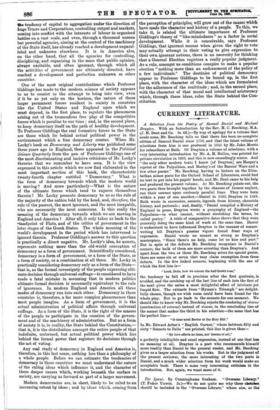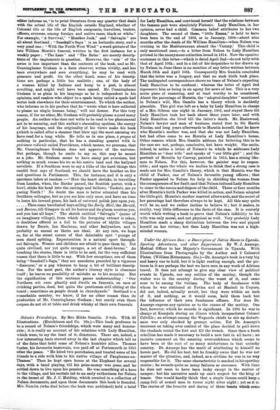The Ipani. By Cunninghame Graham. " Overseas Library." (T. Fisher
Unwin. 2s.)—We do not quite see why these sketches should be included in the " Overseas Library," whose aim, as the editor informs us, " is to print literature from any quarter that deals with the actual life of the English outside England, whether of Colonial life or the life of English emigrants, travellers, traders, officers, overseas, among foreign and native races, black or white." For example, "A Survival," "Heather Jock," and Salvagia " are all about Scotland ; Snaekall's Saga is an Icelandic story, and a very good one ; "With the North-West Wind " a word-picture of the late William Morris's funeral, written in the first instance for a weekly paper ; " The Lazo " and " The Bolas " are merely descrip- tions of the implements in question. However, the " aim " of the series is less important than the contents of the book, and as Mr. Cunninghame Graham is a keen observer, writes vividly, and has been everywhere and seen everything, he may be read with pleasure and profit. On the other hand, some of his descrip- tions are perhaps a little too realistic ; one, of the body of a woman killed by Indians and hung to a post, is almost revolting, and might well have been spared. Mr. Cunninghame Graham is as plain in his language as he is independent in his opinions, and readers who object to a spade being called a spade had better look elsewhere for their entertainment. To which the author, who informs us in his preface that he " wrote what is here collected to please no single human being," will not demur. For this very reason, if for no other, Mr. Graham will probably please a good many people. An author who does not write to be read is too phenomenal not to be amusing, and this author's abounding egotism, the energy of his language, and the originality of his views make his book (which is called after a steamer that blew up) the most amusing we have read for a long while. He tells us in one place, apropos of nothing in particular, that he has a standing quarrel with la precieuse ridicule called Providence, which means, we presume, that Mr. Cunninghame Graham does not approve of the universe. But perhaps, though he omits to say so, this may be meant as a joke. Mr. Graham seems to have many pet aversions, but nothing so much rouses his ire as his native land and the kailyard novelists. If a Southron were to say a tithe of the hard things this candid Scot says of Scotland, we should have the heather on fire and questions in Parliament. This, for instance, and it is only a specimen taken at random :—" How the heart shrinks, in travelling from London, when, the Border passed, the Scottish porter, with a howl, sticks his head into the carriage and bellows, Tackets, are ye gaeing North ? ' No doubt the man is better educated than his Southron colleague, but as you see him only once, and have no time to learn his inward grace, his lack of outward polish jars upon you.
Then come barefooted boys selling the Daily Hail, the Herald, and Review, till Glasgow in all its horror and its gloom receives you, and you lose all hope." The sketch entitled " Salvagia" (name of an imaginary village), from which the foregoing extract is taken, is doubtless offered as a foil to the pictures of idyllic villages drawn by Barrie, Ian Maclaren, and other kailyarders, and is probably as unreal as theirs are ideal. At any rate, we hope so, for at the street corner of that delectable spot " groups of men stand spitting. Expectoration is a natural sport through- out Salvagia. Women and children are afraid to pass them by. Not quite civilised, nor yet quite savages, a set of demi-brutes." As touching the stories, there is little to be said, for the very sufficient reason that there is little to say. With few exceptions, one of them being " Snaeliall's Saga," they are anecdotes preceded by a vigorous "discourse," or a peg whereon to hang a bit of brilliant descrip- tion. For the most part, the author's literary style is clearness itself ; he leaves no possibility of mistake as to his meaning. But the signification of this sentence passes understanding : " Our Northern wit runs ghastly and dwells on funerals, on men at drinking parties, dead, but quite the gentleman still sitting at the board ; sometimes on people drunk in churchyards." Scotland is a remarkable country, we know, if for no other reason than its production of Mr. Cunninghame Graham ; but surely even there corpses do not sit at table and drink whisky at their own funerals.



















































 Previous page
Previous page